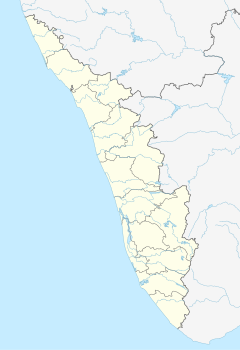Trithala Maha Siva Temple (Malayalam: തൃത്താല മഹാ ശിവക്ഷേത്രം) is an ancient Hindu temple dedicated to Lord Shiva is situated on the banks of the Bharathappuzha river at Thrithala of Palakkad District in Kerala state in India.[3] References to this temple are found in Aithihyamala of Kottarathil Sankunni and many classics of Malayalam Literature.[4] The place where the idol is worshiped in the temple resembles the addition of sand. Legend has it that the Shiva Linga was made by Agnihotri by using the sand from Bharathapuzha river. Anointing is not performed because it is a Shivling of sand. The Shivalinga sits slightly oblique, as the mother of Agnihotri held on to the force, there was a slight tilt.[5] The temple is a part of the 108 famous Shiva temples in Kerala.[6] According to historians, the Trithala Siva Temple, built in the 9th or 10th century, marks the transition from Chola to Pandya style architecture.[7]
| Trithala Maha Siva Temple | |
|---|---|
തൃത്താല മഹാ ശിവക്ഷേത്രം | |
 Temple Tower | |
| Religion | |
| Affiliation | Hinduism |
| District | Palakkad[1] |
| Deity | Shiva |
| Festivals | Maha Shivaratri |
| Location | |
| Location | Trithala |
| State | Kerala |
| Country | |
| Geographic coordinates | 10°48′19″N 76°07′57″E / 10.805172°N 76.132518°E |
| Architecture | |
| Type | Architecture of Chola or Pandya style |
| Completed | 9th Century[2] |
| Specifications | |
| Temple(s) | 1 |
| Elevation | 37.34 m (123 ft) |
History edit
Trithala Maha Siva temple, probably built during the 9th and 10th century, marks the transition from the Chola to the Pandya style of temple architecture.[8]
The Legend edit
The legend of 'Parayi petta panthirukulam' is centered on Trithala. According to this legend, a Brahmin named Vararuchi, married a lower caste woman named Panchami. After the marriage, they set out on a long journey.[9] During the course of the journey, the Panchami became pregnant several times, and every time she delivered a baby, the husband asked her to leave it there itself. Each of the babies was taken up by people of different castes (totally 12), thus they grew up in that caste, making the legendary 'Panthirukulam'. They all became famous in their lives and many tales are attributed to them. The eldest was Brahmadathan Agnihothri, a Brahmin, whose place is Mezhathur in Trithala. The others are Pakkanar (Basket weaver), Rajaka (Laundry man), Karakkal Matha (The only female member), Akavur Chathan, Vaduthala Nair (Kshatriya/Warrior), Thiruvalluvar (Philosopher), Uppukuttan (a Muslim), Pananar (a Panar), (Perumthachan (Master carpenter), Naranathu Bhranthan (an eccentric but divine person), Vayillakunnilappan (a child without mouth, whom the mother wanted to keep with her). Their stories are mentioned in the well known book 'Eithihyamala' by Kottarathil Sankunni.[10]
According to legend, a boy from Vemancheri Mana named Agnihotri (first son of Vararuchi and Panchami) went to the river to bath with his mother. The boy took the sand and made a heap on the shore. When the mother tried to remove it, she found that it was hardened in the form of a Shiva linga. Thus, the famous Trithala siva temple that exists today was built. It is said that the river is said to have the altered course to make the sanctum sanatorium of the temple. It is mentioned about the temple and temple village in the chapter titled 'Pantheerukulam (Malayalam: പന്തിരുകുലം)', of Aythihyamala written by Kottarathil Shankunni.[11]
Temple Architecture edit
Trithala is an important archaeological place in Kerala. Trithala Siva is located on the southern bank of Bharathapuzha river, about 75 km from the Palakkad. The most striking feature of the temple is that it is still preserved as the oldest archaeological site in Kerala. The Trithala and Siva Temple is known for its ruins and historical monuments that date back to the ninth or early 10th centuries.[12]
References edit
- ^ "Thrithala, Palakkad, River Bharathapuzha".
- ^ Shaji, K. a. (8 April 2015). "The tale told by the river at Thrithala". The Hindu.
- ^ "Thrithala - Mahadeva Temple". www.shaivam.org.
- ^ Kottarathil, Sankunni (2018). Aithihyamala (Malayalam). 1 (Issue No. 1 ed.). Kottayam, Kerala, India: DC Books. p. 20. ISBN 9780195698893.
- ^ "Legend - Thrithala Maha SivakshethramThrithala Maha Sivakshethram". Archived from the original on 5 November 2019. Retrieved 5 November 2019.
- ^ "108 Shiva Temples in Kerala created by Lord Parasurama". www.vaikhari.org.
- ^ Shaji, K. a. (8 April 2015). "The tale told by the river at Thrithala by K A Shaji". The Hindu.
- ^ Biju, Mathew (September 2017). Pilgrimage to Temple Heritage. 1 (Issue No. 10 ed.). Kacheripady, Kochi, India: Info Kerala Communications Pvt. Ltd. p. 155. ISBN 978-81-934567-0-5.
- ^ "Vararuchi and Mezhathol Agnihothri".
- ^ Amaresh Datta (1988). Encyclopaedia of Indian Literature: Devraj to Jyoti. Sahitya Akademi. pp. 1735–. ISBN 978-81-260-1194-0.
- ^ "Thrithala, Palakkad". www.keralatourism.org.
- ^ Pilgrimage to Temple Heritage. 1 (Issue No. 10 ed.). Kacheripady, Kochi, India: Info Kerala Communications Pvt. Ltd. September 2017. p. 155. ISBN 978-81-934567-0-5.
